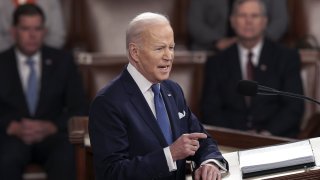
The way presidents talk today has changed a lot since George Washington's time. Many have TV-friendly soundbites ready or fall-back phrases, like President Joe Biden's "here's the deal, folks." But if talk is getting more snappy, is it getting less sophisticated? New data, including Biden's latest speech, suggests yes.
According to an NBC analysis of State of the Union (SOTU) speeches, complexity has been falling since the 1930s, when President Franklin Roosevelt consolidated the modern practice of spoken addresses.
Measuring complexity is difficult. Popular measures, like the Flesch-Kincaid readability tests, can parse text and spit out rankings or grade levels, but they’re only based on simple statistics, like syllables per word and sentence length.
The Hurricane season is on. Our meteorologists are ready. Sign up for the NBC 6 Weather newsletter to get the latest forecast in your inbox.
But in the field of psychology, researchers use a more robust tool called integrative complexity. Under a hand-scored system developed roughly 40 years ago, words are marked on a sliding scale based on the probability they’re associated with sophisticated thought. Dr. Lucian Gideon Conway III, a professor of psychology at the University of Montana, used this system to create AutoIC, a computer algorithm that automates the process.
Biden's most recent speech scored a 1.5 — lower than any previous president. However, former Republican President Donald Trump's speeches were also historically low, measuring a 1.58 in 2020.
U.S. & World
To put those numbers into context, children's books like "Goodnight Moon" or "Where the Wild Things Are" score a 1.0 and 1.31 respectively, while Immanuel Kant's notoriously difficult "Critique of Pure Reason" gets a 2.9.
Part of the reason for declining speech complexity could be partisan politics. As Conway points out in his 2022 study, politicians pandering to a singular audience can use simpler language; they don't need to acknowledge competing takes.
Trump, for example, also has a totally different speaking style than most politicians. Even in formally prepared remarks, such as his inaugural address, he tends to rely more heavily on repetition than past presidents as a strategy to drive home key messages.
Speaking casually also may be an effective tactic for bolstering public appeal. In the wake of the COVID-19 pandemic, academics have cited a growing movement in the United States rooted in anti-intellectualism, a distrust of science and experts. For this swath of Americans, the appeal of simple language is relatability.
Closing out Biden's first SOTU address, he said, "In this Capitol, generation after generation, Americans have debated great questions amid great strife, and have done great things." Whatever the case, these days presidents are also talking about them more plainly.



